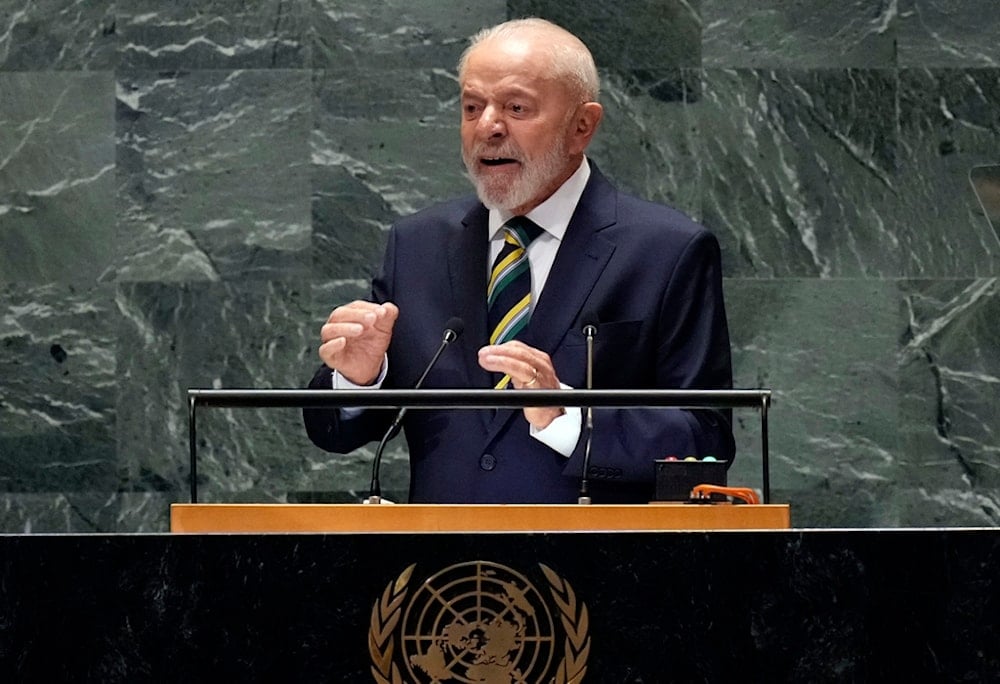Lula decries Latin America, Africa exclusion from permanent UN seats
Brazilian President Lula da Silva denounces the UN Security Council over its structure, underlining that it reflects a history of colonialism.
-

Brazil President Luiz Inacio Lula da Silva addresses the 79th session of the United Nations General Assembly, September 24, 2024 (AP)
Brazilian President Luiz Inacio Lula da Silva on Tuesday condemned the structure of the United Nations Security Council (UNSC) as an enduring vestige of colonialism noting that it would be difficult to reform such an institution.
Addressing world leaders at the UN General Assembly, Lula criticized the lack of representation for Latin America and Africa among the permanent members of the council.
"The exclusion of Latin America and Africa from permanent seats on the Security Council is an unacceptable echo of the practices of domination of the colonial past," Lula declared.
In his speech, Lula called for a "comprehensive review" of the UN Charter to reform its institutions and address pressing global issues, such as the fight against climate change. However, he expressed realism about the obstacles facing such reforms, remarking, "I am under no illusions about the complexity of such reform, which would go against ingrained interests that maintain the status quo."
The UNSC currently consists of five permanent members with veto power — the United States, China, Russia, the United Kingdom, and France. These nations' positions stem from their roles as victors in World War II, which has led to longstanding criticisms about the council's failure to reflect the status quo.
Although during the same address, US President Joe Biden also called for expanding the roster of permanent members, Washington has rejected proposals to grant veto rights to any new UNSC members.
Brazil, alongside Germany, India, and Japan, has long pushed for reform, seeking permanent Security Council seats for themselves. The foreign ministers of the four countries met on Monday, reaffirming their commitment to this joint bid for greater representation at the UN's highest decision-making body.
US seeking to serve own self-interest
In an effort to repair strained relations with African nations and strengthen ties with Pacific Island countries, the US is backing the creation of two permanent United Nations Security Council seats for African states, along with a rotating seat for small island developing states of the Pacific Islands.
This move comes amid growing discontent in Africa over Washington’s support of the Israeli occupation's genocidal war on the Gaza Strip, and as the US looks to bolster its influence in the Pacific while attempting to balance global power shifts in favor of China.
According to the US ambassador to the UN, Linda Thomas-Greenfield, the US is set to make the announcement on Thursday and "move this agenda forward in a way that we can achieve Security Council reform at some point in the future."
Thomas-Greenfield described this move as part of US President Joe Biden's legacy but ahead of the upcoming announcement at the Council on Foreign Relations in New York, the ambassador clarified in an interview with Reuters that Washington opposes extending veto power to any new members.
The UN Security Council, originally comprised of 11 members at its founding in 1945, was expanded to 15 in 1965. Today, it includes 10 elected nations serving two-year terms and five permanent members with veto power: the US, the UK, France, Russia, and China.
Changes to Security Council membership require amending the UN Charter, which must be approved by two-thirds of the General Assembly and the five current veto powers. While the 193-member General Assembly has debated Security Council reform for over a decade, recent geopolitical tensions have increased calls for change, as rivalries have often paralyzed the council.

 4 Min Read
4 Min Read








